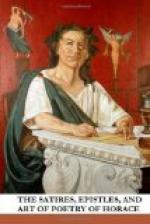PAGE 135.
I’ve shed no blood. You shall not feed the crow.
I’ll have thee hanged to
feed the crow.
Scott, Lay of the Last Minstrel.
PAGE 136.
The wise and good, like Bacchus in the play.
Borrowed from Francis, with a slight change in the order of the words.
PAGE 140.
In sing-song drawl, or Gnatho in the play.
“Partes mimum tractare secundas” seems to mean “to act the stage parasite,” who, according to Festus, wag the second character in almost every mime. I thought therefore that I might substitute for the general description the name of a particular parasite in Roman comedy.
PAGE 144.
Let temperate folk write
verses in the hall
Where bonds change hands.
Strictly speaking, there does not seem to have been a hall of exchange at the Puteal, which was apparently open to the sky: but the inaccuracy is not a serious one.
PAGE 151.
While all forlorn the
baffled critic stands,
Fumbling a naked stump
between his hands.
I had originally written
By the old puzzle of the dwindling mound
Bringing at last the critic to the ground,
which of course represents the Latin better: but it occurred to me that the allusion to the sophism of the heap, following immediately on the similar figure of the horse’s tail, could only embarrass an English reader, and would therefore be out of place in a passage intended to be idiomatic. Howes has got over the difficulty neatly:—
Till my opponent, by fair logic beat,
Shall find the ground sink fast beneath
his feet.
PAGE 151.
Enjoys his ease, nor
cares how he redeems
The gorgeous promise
of his peacock dreams.
I suppose the meaning to be this: Ennius, as appears from his own remains and the notices of him in other writers, began his Annals with a dream in which the spirit of Homer appeared to him, and told him that, after passing through various other bodies, including those of Pythagoras and a peacock, it was now animating that of the Roman poet himself. How this was connected with the subject of the Annals we do not know; probably not very artificially: Horace, as I understand him, means to ridicule this want of connexion, while he says that the critics are so indiscriminate in their praises that Ennius may well repose on his laurels, and not trouble himself as to whether there is any real connexion or no.
PAGE 152.
Just as an unfair sample,
set to catch
The heedless customer,
mil sell the batch.




